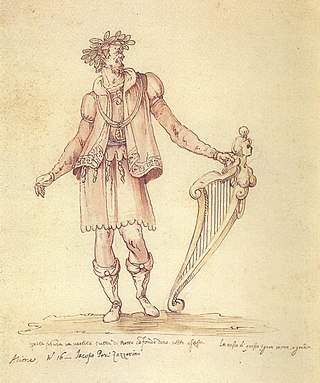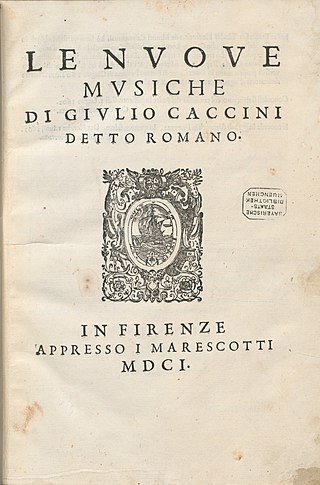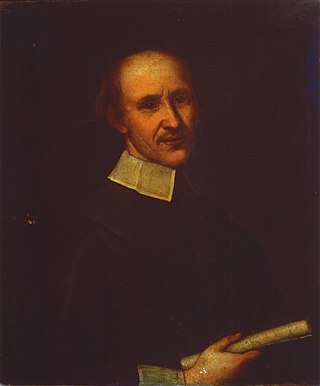Related Research Articles

Benedetto Giacomo Marcello was an Italian composer, writer, advocate, magistrate, and teacher.

Jacopo Peri was an Italian composer, singer and instrumentalist of the late Renaissance and early Baroque periods. He wrote what is considered the first opera, the mostly lost Dafne, and also the earliest extant opera, Euridice (1600).

Emilio de' Cavalieri, or Emilio dei Cavalieri, was an Italian composer, producer, organist, diplomat, choreographer and dancer at the end of the Renaissance era. His work, along with that of other composers active in Rome, Florence and Venice, was critical in defining the beginning of the musical Baroque era. A member of the Roman School of composers, he was an influential early composer of monody, and wrote what is usually considered to be the first oratorio.

Giulio Romolo Caccini was an Italian composer, teacher, singer, instrumentalist and writer of the late Renaissance and early Baroque eras. He was one of the founders of the genre of opera, and one of the most influential creators of the new Baroque style. He was also the father of the composer Francesca Caccini and the singer Settimia Caccini.

Francesca Caccini was an Italian composer, singer, lutenist, poet, and music teacher of the early Baroque era. She was also known by the nickname "La Cecchina", given to her by the Florentines and probably a diminutive of "Francesca". She was the daughter of Giulio Caccini. Her only surviving stage work, La liberazione di Ruggiero, is widely considered the oldest opera by a woman composer. As a female composer she helped to solidify the agency and the cultural and political programs of her female patron.

Tarquinio Merula was an Italian composer, organist, and violinist of the early Baroque era. Although mainly active in Cremona, stylistically he was a member of the Venetian school. He was one of the most progressive Italian composers of the early 17th century, especially in applying newly developed techniques to sacred music.

Giovanni Legrenzi was an Italian composer of opera, vocal and instrumental music, and organist, of the Baroque era. He was one of the most prominent composers in Venice in the late 17th century, and extremely influential in the development of late Baroque idioms across northern Italy.
The year 1707 in music involved some significant events.
The year 1703 in music involved some significant events.
The year 1610 in music involved some significant events.
The year 1625 in music involved some significant events.
The year 1614 in music involved some significant musical events.
The year 1629 in music involved some significant events.
The year 1609 in music involved some significant events.
The year 1617 in music involved some significant events.
Antonio Maria Abbatini was an Italian composer, active mainly in Rome.
Carlo Grossi was an Italian composer.
Andrea Salvadori was an Italian poet and librettist. He was born in Florence and educated at the Collegio Romano in Rome. From 1616 until his death in Florence at the age of 43, he was the principal court poet to the Medici family. In addition to numerous theatrical entertainments and poems, he wrote the libretti for five operas, four of which have survived, although only La Flora composed by Marco da Gagliano and Jacopo Peri has an extant score. He was married twice, first to Emilia Rigogli by whom he had three sons and then to the painter Alessandra Furini. A collection of Salvadori's principal works curated by his son Francesco was published in 1668.
References
- ↑ Don, Randel (1996). The Harvard Biographical Dictionary of Music. Harvard University Press. p. 815. ISBN 9780674372993.
- ↑ Apel, Willi (1969). Harvard Dictionary of Music . Harvard University Press. p. 51. ISBN 9780674375017.
- ↑ Il pianto di Rodomonte (in Italian). 1971. Retrieved 7 May 2019– via National Library of Australia.
- ↑ Murata, Margaret (2002). "Erminia sul Giordano : Grove Music Online - oi". oxfordindex.oup.com. doi:10.1093/gmo/9781561592630.article.o901417 . Retrieved 7 May 2019.
- ↑ Unger, Melvin P. (2010). Historical Dictionary of Choral Music. Scarecrow Press. p. 236. ISBN 9780810873926.
- ↑ Pfitzinger, Scott (2017). Composer Genealogies: A Compendium of Composers, Their Teachers, and Their Students. Rowman & Littlefield. p. 194. ISBN 9781442272255.
- ↑ "Jacopo Peri | Italian composer". Encyclopedia Britannica. Retrieved 7 May 2019.
- ↑ "Jehan Titelouze | French musician". Encyclopedia Britannica. Retrieved 7 May 2019.